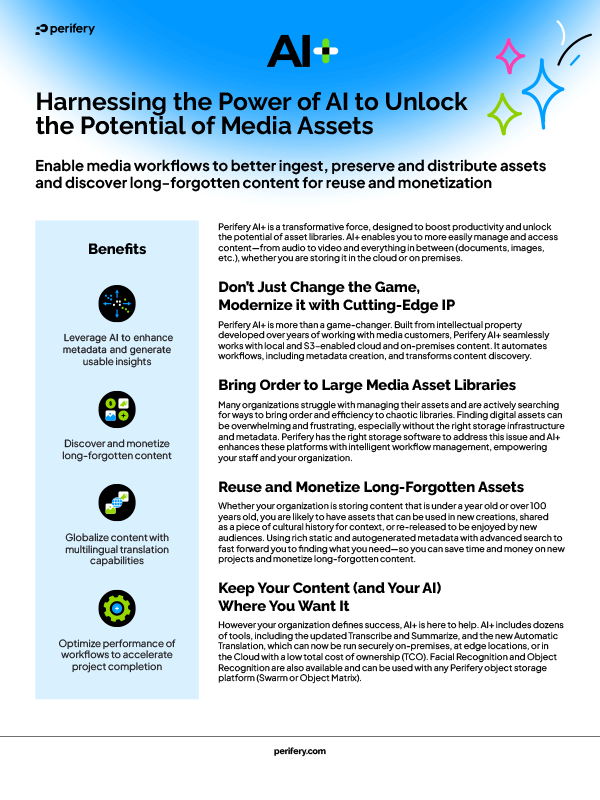
In our latest white paper, The Evolution of Media Archiving, written by Jonathan Morgan, SVP Product and Technology at Perifery, the state of archiving comes under scrutiny. Despite holding huge value, keeping media assets secure and accessible over extended periods of time has been somewhat of a challenge for many companies in the M&E sector. In our previous blog, we explored the importance of preserving media and highlighted some of the challenges faced by media organizations. In this blog, we summarize Jonathan’s 10 foundational principles which essentially explain how archives can be preserved for 100+ years.
The 10 Principles
1. Digital governance
Establishing a digital governance policy whenever your data is stored provides assurance that your content is both protected and authentic. Considering the balance between data security and affordability, the policy should include factors such as loss protection, value, and governance requirements, and while it’s crucial for storage, the policy should remain flexible.
2. User security
Media archives should feature the highest levels of user authentication. Management systems should facilitate permission granting, ensuring only those authorized are able to access data. Additionally, stored assets should be immutable to provide an added layer of protection against ransomware.
3. Open formats
To maintain the integrity and accessibility of archived materials long into the future, any data, metadata, audits, and policies should be stored in an open format. This ensures that the assets remain readable and usable with future technologies.
4. Multi-platform support
Don’t assume that the technology of today will be around tomorrow. Trends change, technologies change, and working practices change. Storage platforms - on-premise, cloud, edge, etc. - should allow archives to remain protected, accessible, and migratable, regardless of the initial platform choice.
5. AI/ML support
Despite artificial intelligence being in its infancy within archiving workflows, it’s potential is massive. From automating processes to enhancing search capabilities and deeper analytical understanding, AI and ML (machine learning) should be considered for optimizing future archive decisions.
6. Data Gravity
Media assets hold huge value, and maintaining their security and usability is crucial. As data volumes grow, this will become more challenging. However, by sending applications to the content, rather than the other way around, organizations can streamline data- and resource-intensive tasks.
7. Costing
Costing feedback is an essential factor for modern and future-conscious archivists. Cost considerations drive key decisions, and should therefore, form part of an archive’s core.
8. Notifications
Potential security breaches can be reduced by simply preparing. By including functionalities that warn of unauthorized access or suspicious activity, administrators can respond and protect their archives in a timely manner – before any damage is done.
9. Content Protection
Protecting your data management solution through digital rights management (DRM) is highly beneficial for the future of your content. Additionally, DRM can feed other aspects of maintaining an archive, such as costing and AI algorithms.
10. Support for ‘delete’
Contrary to belief, it is possible to have too much data stored in your archive. Deleting unnecessary content is completely rational, but it needs to be done in a failsafe manner. Archives should support the deletion of data, but there should be layers of protection around this capability.
The above principles will help achieve the long-term preservation of archives. Today’s content is tomorrow’s history, and in 100 years', media teams could be using the assets of today to generate new content, supported by meaningful and accurate data. It is, therefore, our duty to ensure these archives make it through the next century.
To support the future of our content, Jonathan Morgan, Perifery’s SVP of Product and Technology, has defined the 10 foundational principles to evolve media archiving. Discover the key considerations for achieving 100-year archives in full detail: Download your copy of our white paper today.
